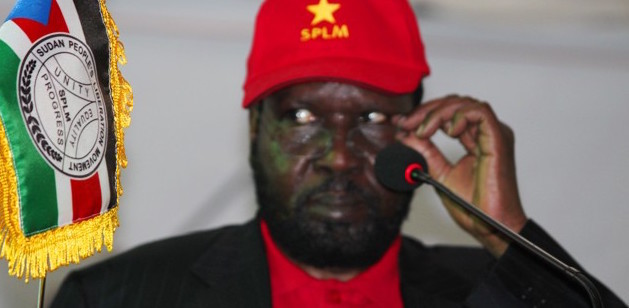South Sudan’s President Salva Kiir today threatened government leaders belonging to Equatorian ethnicities while also acknowledging and defending a trend of military recruitment predominantly among his own ethnic Dinka.
Kiir made these startling remarks today at Freedom Hall while addressing party members including top officials. His speech was punctuated by interruptions by a military band.
“There is a need to urgently return peace to the country,” he declared as the band played.
The president warned that he could directly take over command of military operations in the Yei area. Rebel groups operating near the troubled town in the Central Equatoria region have challenged the government for control.
The president suggested that he is growing impatient with the situation. Referring to recent roadside ambushes in Equatoria he said, “How long do you think people will remain patient?”
Kiir and other officials have appeared incensed over the recent attacks including a by now infamous ambush on the Yei-Juba road. Sources have told Radio Tamazuj that victims of that attack included people of several ethnicities, but senior officials and state-run media have focused on the victims belonging to Kiir’s own tribe only.
In his speech today Kiir warned, “We will not just sit in Juba, we will go out. And I said the other time when I sent my advisors (Clement Wani and Daniel Awet) to Yei, I told them you go to Yei and tell the people that those who are now disturbing them are their own sons. If they don’t call them back, I will go to Yei myself.”
He continued, “I will locate to go and stay in Yei and all the operations that will go out will go out under my directives and my supervision.” A military band struck up playing immediately after this remark and continued playing for about a minute.
In the meantime, however, President Festus Mogae, the leader of the monitoring body set up to help implement South Sudan’s peace agreement, called today for an urgent return to peace implementation.
Mogae said, “We urge the [government] to establish an environment within which all people of South Sudan, irrespective of their ethnicity or background, can safely return and engage in constructive and peaceful dialogue.”
On the other hand, Kiir warned Equatorian members of his government that they must rein in their ‘sons’ whom he says are perpetrating violence against members of his tribe and government. Kiir addressed Equatorians in the audience directly. Among those present were his deputy James Wani Igga, the speaker of parliament, the governor of Jubek State, and several lawmakers.
“Leaders of Equatoria, you have all the ability to stop all this nonsense on the roads. Because if you are in the government, there is no way that your people can go against the government you are in,” he said.
The president then went on to suggest that his own tribe had played a disproportionately large role in the liberation struggle of 1983-2005 saying, “All those who were with us in the bush, they knew what we were doing, myself, Comrade Daniel Awet is here — we come from Bahr al Ghazal — comrade Kuol Manyang is here. We were all in the leadership of the SPLM/SPLA. Why did we remain in the SPM/APLA when things were very difficult?”
It is a common ethnic stereotype in South Sudan, defended by some and rejected by others, that the Dinka tribe played a major role in the liberation struggle disproportionate to that of other tribes. In his speech today Kiir went on to recall that large numbers of SPLA recruits came from the Dinka heartland of Bahr al Ghazal.
“When we were fighting, Dr. John and myself, would order Daniel Awet, who was the commander of the whole of Bahr al Ghazal area to give us reinforcements. He will come with 5000 [up to] 10000,” Kiir said.
Responding to accusations that his army is a tribal army of the Dinka he said, “But where will I get people from if people of Equatoria have refused to join the army? Riek Machar has rebelled with his Nuer people.”
South Sudan’s national army SPLA has mobilized tens of thousands of fighters in Kiir’s native Bahr al Ghazal region since the outbreak of civil war in 2013. Kiir explained that there is nothing wrong for his tribesman to be in the army or if all soldiers are coming from Bahr al Ghazal region.
He warned of the danger of more serious violence in the Equatoria region.
“These targeted killings, if they are not stopped by the people who are actually engineering them, how long do you think people will remain patient?” Kiir questioned.
“I don’t want this thing to continue. And I don’t want anybody to retaliate for a revenge, we don’t want to revenge anybody, because the people who will go and die will be very innocent people, they did not know what was being done by the rest. Because this is a political incitement. And all this is being done so that to urge the international community to bring in the UN intervention forces. But even if the intervention forces come here, the people who are now calling for these forces, you will never laugh.”
He went on to compare his country to Congo in the 1960s when they United Nations imposed a civilian and military peacekeeping operation to take over certain functions of government and security. Kiir suggested that Congo today has still not gotten its full independence. “Are they in control of their country?” he said of the Congolese. “We don’t want this thing to happen,” he added.




